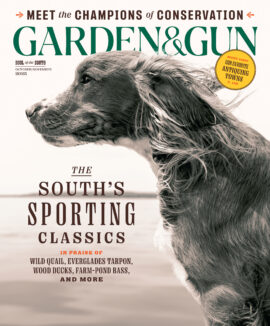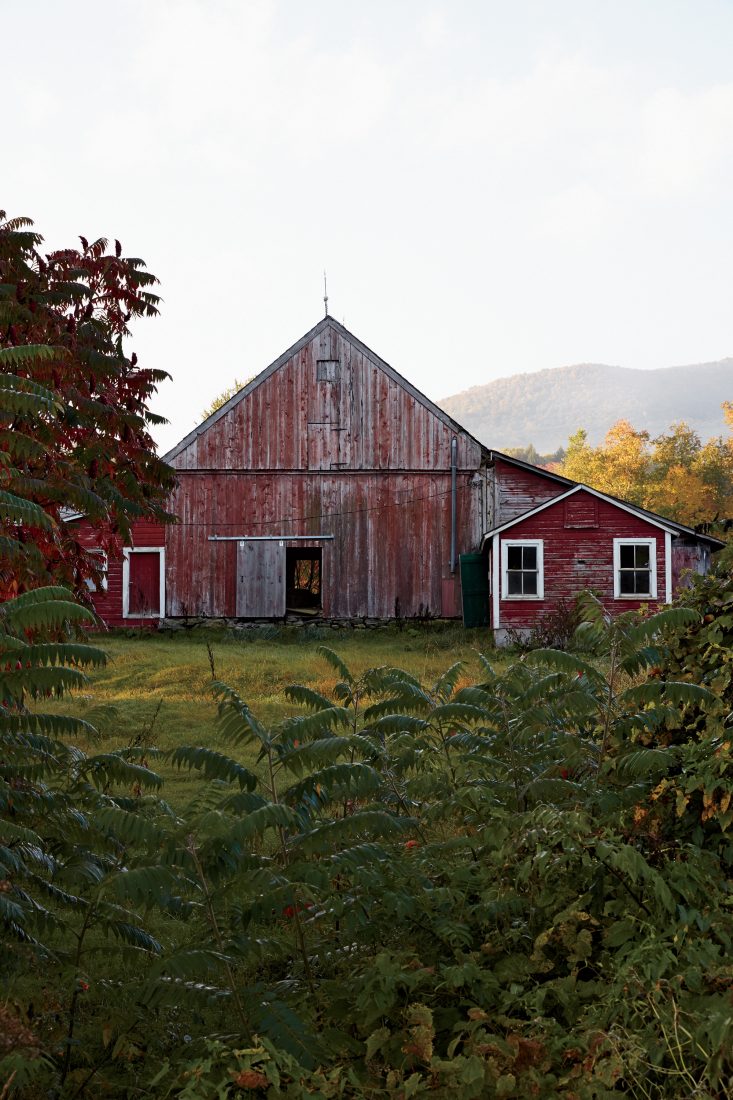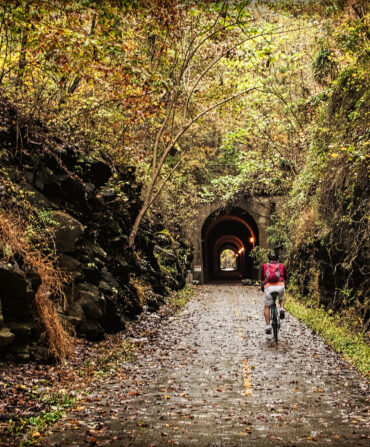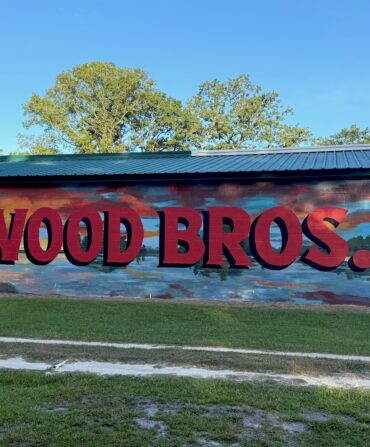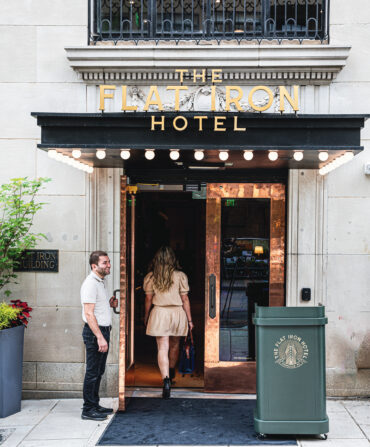I made my first trip to Vermont because Howard Dean was running for president and I was writing about him for Vogue. It was fall 2003, and Dean was not only still Vermont’s governor, he was also—astonishingly—the front-runner for the Democratic nomination. I’d already followed him all around Iowa and now we were shooting his portrait on a friend’s borrowed boat. My mission was to see if he was any more charming on his home turf (no). I flew to Burlington from Newark in the morning, asked a few questions and took some notes while Dean posed, bought some souvenir syrup I never opened at the airport gift shop, and was on the ground in Manhattan in plenty of time for dinner.
It was hardly a life-altering introduction. I’d imagined acres of Ben & Jerry’s “happy cows” or something equally—cartoonishly—picturesque, but I managed to miss Vermont’s much-vaunted bucolic bits. (So, apparently, had the New York–born Dean—on a dawn visit to an Iowa pig farm, he wore suit pants and refused to pet or pose with the animals, which was pretty much the point of the exercise.) On the other hand, Burlington’s a big place (the metro population is roughly one-third that of the whole state). It’s also alarmingly close to Canada (forty-five miles). It wasn’t until a decade later, when I made a brief trip to southern Vermont, that I fell completely, obsessively in love with the state—and its food, its people, its perfect summer weather, and its remarkably creative spirit.
This time the occasion was a book tour. My (now) very good friend Ellen Stimson had arranged a signing for me at Manchester Center’s Northshire Bookstore, an independent bookseller of such awe-inspiring breadth, depth, and square footage that the store alone is worth a trip. Also, my Mississippi-born-and-raised pal Abby Coker had recently married Rogan Lechthaler, a Vermonter who (I’d heard) happened to be a terrific chef. They’d just opened a restaurant, the Downtown Grocery, in nearby Ludlow. I figured I’d eat some good food and sell a few books, and I did, but there was so much more to it than that.

Photo: Jennifer Causey
Bonus Images
Click to see more photos from this story.
First, there was dinner. The plan was to meet my husband in Boston and take a leisurely drive over (so I could finally view those cows), but both our planes were late and we drove like crazy people, in the dark on narrow roads, to make it before the restaurant closed. We needn’t have worried. The place was hopping, infused with Abby’s energetic Southern charm and inventive (and potent) cocktails. We ordered strawberry rhubarb caipirinhas followed by a bottle of rosé and settled in to read the menu. It’s on a big blackboard that also features the line “LIKE WHAT YOU SEE HERE? Buy the kitchen a round of tall boys…$6”—Abby’s way of skirting the Vermont law that makes tipping kitchen staff illegal.
Already, I was home, and then the food came out. It’s all a bit of a blur by now, but I remember river trout with a brown butter caper sauce preceded by the crispy fried trout bones (Abby described them as a “troutified crouton”—the girl knows how to sell a menu) on a plate with house-made tartar sauce and radishes and greens Rogan had grown and tiny onions that he’d pickled. One of us had the deckle, that extra-marbleized top cap of a rib eye, rolled up like a fillet and accompanied by local lovage, oyster mushrooms, and an over-the-top crab hollandaise, but it was hard not to try everything. A fisherman had dropped off some halibuts’ tails, so they were on offer, grilled and simply dressed; the tomatoes weren’t ready yet, but there was pesto made of the plants’ young leaves (who knew?). For dessert we skipped the sorbets (made of everything from young spruce shoots to cantaloupe and cayenne), in favor of the insane “late night breakfast”: warm French toast, buttermilk-bacon ice cream, Grade B maple syrup, and candied Vermont bacon.
I woke up grateful that Rogan had had sense enough to leave a good gig as the chef at one of Vermont’s only Relais & Chateaux properties (Warren’s very fine Pitcher Inn) to chase Abby all the way to Oxford, Mississippi, where he learned to cure meat with the Mario Batali protégé Dan Latham. I was also treated to what might be the best cup of coffee I’ve ever had. Made in Abby’s kitchen with dark-roasted beans from Burlington’s Speeder and Earl’s, it was mixed with heavy cream and the same Grade B syrup as the previous night’s dessert. Unlike my touristy plastic airport jug, Grade B is the secret good stuff, Abby explained: richer, darker, less filtered.
Our next stop was Ellen’s. Even though we’d never met (I’d blurbed her first book, Mud Season, and we’d become immediate e-mail buddies), she insisted on throwing me a party after the signing and putting us up in her farmhouse with the dogs and kids and chickens and cat I’d read all about in the galleys of her book. A memoir, it’s the story of how Ellen and her husband, John, decided to move themselves and their three kids from St. Louis to Dorset, a town straight off a picture postcard, and the mayhem that ensues as a result. They’d made the decision after a particularly lovely long weekend, which I now totally get, and bought the house, plus a general store that drove them to the brink of both insanity and bankruptcy.

Photo: Jennifer Causey
Greener Pastures
Stage one of the cheese-making process at Consider Bardwell Farm.
I loved Ellen’s book (she’s since written two more) because she’d made exactly the kind of move I would have. What a great idea to take over a centuries-old general store and give it new life with gourmet mac and cheese, a wine room, and locally made ice cream—no matter that the more crotchety regulars just wanted to know why she’d moved the bread rack. With the store well behind them, John returned to teaching and Ellen writes and runs a company that raises money for nonprofits (including Putney’s Greenwood School, a school for young men with severe learning disabilities that was the subject of 2014’s The Address, one of the few one-off documentaries Ken Burns has ever made and, for my money, the most moving).
Ellen, whose Southern charm and enthusiasm rival Abby’s (okay, she’s from Missouri, but so is my father and so was Mark Twain), seems also to have befriended almost everybody who lives in the bottom half of the state. Which was lucky for me because they all turned up to hear me read and (mainly) to eat Ellen’s Yankee Deviled Eggs, the aforementioned mac and cheese with lobster (both recipes are in Mud Season), and John’s justifiably famous grilled tenderloin. The next morning, she whipped up these amazing prosciutto brioche things (I still can’t figure out why that store was not the most popular place in the state), and we ate them on the porch with the dogs at our feet.
Before we left town, we stopped at the Sunday farmers’ market in Dorset (weekly, from May through October) and bought more cheeses than we could eat and armloads of handmade Filthy Farmgirl soaps, my new addiction. Ellen’s son Eli gave me a bite of his chocolate crepe from the cool French couple who have a regular booth, and Abby took me to the Luna Moth Designs table, where she bought the carved coral and turquoise piece that was her wedding necklace. On the drive back, I saw more cows and glimpses of pastoral paradise than I could wrap my head around. We’d been there for two nights and less than forty-eight hours, but it had been the perfect storm. I vowed to go back and back.
I did and I do, and on each trip the connection gets deeper. Much of the time, I feel as though I could be home in the Delta, except that there are actual mountains and hills rather than levees and Indian mounds, and the summer weather is way more pleasant. But everybody’s growing stuff and making really tasty things with it, or they’re doing a whole lot of hunting and fishing. Ellen’s son Benjamin, a maker of short films, spends every moment of his free time, depending on the weather, catching and releasing trout or hunting grouse with Olive, his loyal Spinone Italiano, one of the oldest breeds of gundog in the world.
I had been a tiny bit afraid that folks would be running around sounding a little too much like Howard Dean or Bernie Sanders, but people are, well, normal. “It’s rural,” Abby says. “People are grounded.” And smart—they keep that big bookstore going, after all, and they seem to also like their whiskey. The almost perfect bar at the Dorset Inn, where I stay when I’m not at Ellen and John’s, offers up a whopping two dozen varieties of single-malt Scotch, a dozen small-batch bourbons, and a half dozen brands of Irish whiskey.
Also, as in the Delta, there’s not always a whole lot going on in great concentration, so folks don’t mind doing a bit of driving to have fun, and little things can be cause for celebration. From Dorset, we’ll go to Ludlow for whatever’s scrawled on the Grocery’s blackboard or to South Londonderry to the very fine SoLo Farm & Table. I’ve spent whole mornings sipping blood orange Pellegrino and eating my favorite Chester cheese outside the “shop” (payment’s on the honor system—you stick your money in a metal box) at West Pawlet’s Consider Bardwell Farm while the baby goats nibble my fingers. I’ve made field trips to the taxidermist in Newfane (the Rustic Moose, where there remains an upright otter I still lust after), the glassblower down the road, and the gallery in Jamaica (Elaine Beckwith) where I bought an etching of an owl.
And so now I am a regular, fighting the increasingly strong temptation to make like Abby or Ellen or Angela Miller, the literary agent who co-owns Consider Bardwell, to dive in and put down roots. Hell, I already have some of a sort—my sweet Nashville cousin Zara, in college at Middlebury, wisely chooses to stay in state for the summers too, and at the bookstore I ran into a friend from boarding school who has a house in Dorset. For now I’ll stay transient and stick with Ellen’s quilted guest bed or the venerable Dorset Inn, but in my head, I’ve already got a second home.
Where to Eat + Drink
Consider Bardwell Farm
Co-owner Angela Miller is a Manhattan literary agent who bought a nineteenth-century “weekend” farm to decompress and ended up becoming a much-lauded maker of artisanal cheeses. Her creations are served in such exalted dining temples as the French Laundry, Jean-Georges, and Blue Hill at Stone Barns, but you can buy them (and Miller’s book, Hay Fever) at the shop, which operates on the honor system. Picnic tables encourage you to stay, and a stack of hand-drawn maps will assist in a self-guided tour. West Pawlet; considerbardwellfarm.com
The Downtown Grocery
Abby and Rogan Lechthaler’s festive, bistro-like spot features a creative cocktail list (try the Hot & Heavy with bourbon and habanero tincture) and such occasional surprises as a crispy pig’s tail or a lamb tamale. But even deceptively simple dishes like arugula salad with house-cured pancetta, local apples, and apple cider vinaigrette, or heirloom tomatoes with house-made ricotta, pack a powerfully tasty punch. Buy the kitchen a round of beers and the staff squawks a rubber chicken. Ludlow; thedowntowngrocery.com
Solo Farm & Table
Chloe Genovart is a local who worked as maître d’ at Thomas Keller’s Per Se (the same year it won a James Beard Award for best service in the country). Her Spanish-born husband, Wesley, has worked in kitchens in both Europe and Manhattan. In 2011, they opened the Beard Award–nominated SoLo, with lovely dining rooms, an inspired menu, and a great bar where the charred peach margarita is a life changer. The garden provides both table flowers and at least some of what’s on your plate. The chef’s Spanish roots are evident in the braised crispy octopus and the Spanish reds on a list that also showcases New England craft beers and ciders. South Londonderry; solofarmandtable.com

Photo: Jennifer Causey
Lamb shoulder with Moroccan-spiced carrots from SoLo Farm & Table.
Woodcock Farm Cheese
A picturesque menagerie of dogs and Friesian sheep roam forty-five acres while yummy cheeses age in the caves. I’m particularly fond of the blues: The delicious True Blue is modeled after a mountain Gorgonzola, and the creamy Kind of Blue has an almost gooey interior in addition to its pretty great name. Weston; woodcockfarm.com
See + Do
Northshire Bookstore
This behemoth of an independent bookstore occupies 10,000 square feet and is a thriving response to those who imagine print is dead. Among its many strong points are an extraordinarily knowledgeable staff, the best postcards ever, a café, an authors’ series, and a children’s book section. Its motto is BOOKS LIVE! And here they sure do. Manchester Center; northshire.com
Robert DuGrenier
Simon Pearce is by far the best-known glassblower in Vermont, and his operation (which includes a restaurant) near Woodstock is definitely worth a visit. But for a slightly less corporate experience, I recommend Mr. DuGrenier, from whom I commissioned a set of lovely clear highball glasses along with some tortoiseshell versions. He shows his wares, which also include glass conch shells and sculpture, in a Georgian mansion called the Taft Hill Collection, and he’s often plying his craft in a studio out back. Townshend; dugrenier.com
Robin Lane Clothing
Robin Lane’s beautifully cut clothes are made of gorgeous linens and silks in subtle colors and are reminiscent of the Row in their stunning simplicity. There are plenty of pieces to try, but she’ll also do custom designs. Manchester Center; robinlaneclothing.com
Roy Egg Shop
Roy Egg, with his long white beard and trademark overalls, looks like a vintage Vermonter, but he spent his childhood on a South Carolina cotton-and-tobacco farm. These days you can find him on the porch of his red-and-white-checkerboard-painted farmhouse/gallery, surrounded by painted wood cutouts of chickens and pigs, cows and crows. There’s much more inside, including painted furniture, framed paintings of fish and animals and eggs (of course), and the occasional piece of antique porcelain or whatever else might strike Egg’s fancy. West Pawlet; 802-645-0981

Photo: Jennifer Causey
gg0415_adventures_11
Cheese aging at Consider Bardwell Farm.
Taylor Farm
A working dairy farm dating from the early 1800s, Taylor makes the only Gouda cheese in Vermont. The maple-smoked version is especially good. You can roam the property, including the picturesque red barn, feed the livestock (there are Belgian horses and a herd of fifty Holstein and Jersey cows), or sign up for a cheese-making class. Londonderry; taylorfarmvermont.com
The Vermont Country Store
It’s almost a cliché, this store, but there really is something for everyone. I spent a pile of dough here on everything from cheese and chocolate to enamel plates, kitchen sponges, and the Lanz nightgowns I hadn’t seen since boarding school. Mildred’s Dairy Bar, a food truck stationed outside, serves an excellent bacon cheeseburger with (what else?) Vermont white cheddar, as well as swell milk shakes. Weston; vermontcountrystore.com
Sleep
The Dorset Inn
Vermont’s oldest continuously operating inn first opened its doors in 1796 and has since expanded to include twenty-five rooms and a spa. A cozy bar features a fireplace and an extensive whiskey selection, while breakfast, lunch, and dinner are served in the meandering dining rooms. The summer weekend “lobster fest” menu includes butter-poached lobster, lobster sliders, and lobster ravioli, to name a few. The all-American wine list is exceptionally well chosen, and dogs are allowed in the guest rooms. Dorset; dorsetinn.com

